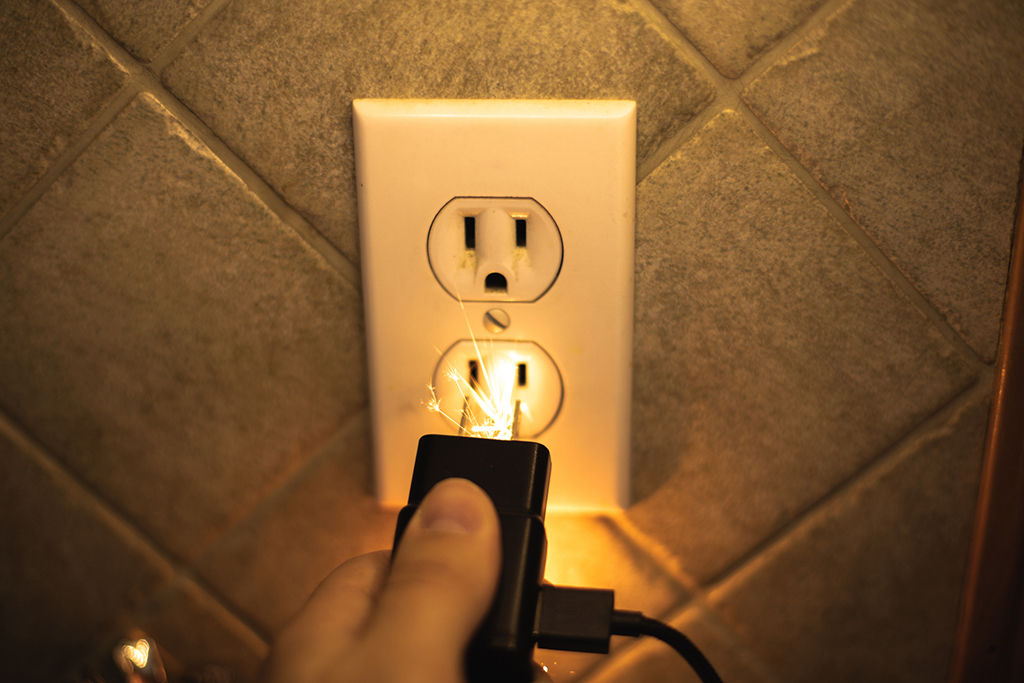
When Should I Consider An Emergency Electrician? | Wilmington, NC
Photo By lightspeedshutter at istock
Electrical faults are the third leading cause of house fires in the United States. Sometimes house fires can be fatal, and they’re always traumatizing. The best way to protect your family and home in Wilmington, NC, is by keeping your electrical system in good condition. However, things can go wrong even in a well-maintained home. An emergency electrician responds whenever a problem occurs, whether it’s during business hours or not. Electricity can be dangerous, and electrocution can be fatal. Anyone who isn’t a qualified electrician probably shouldn’t be attempting complex repairs or upgrades such as rewiring jobs or expanding circuits. Amateurs definitely shouldn’t try to find and fix the problem when someone goes wrong.
Power Outages and Circuit Breakers
You may have a problem if your circuit breaker keeps tripping. Local power surges can trip a breaker, but this shouldn’t happen often. An overloaded circuit is also a common reason for tripping. This can be fixed simply by unplugging some things and spreading the electrical load around. However, you need to call an emergency electrician if your circuit breaker keeps acting up without any identifiable cause.
Circuit breakers are a home’s main defense against electrical problems, so this part of your home should always be in good condition. Power outages can occur for several reasons as well. If a power outage affects the entire neighborhood, you probably don’t have anything to worry about. The problem is likely occurring at the source or at some point in the distribution network. An outage that only affects your home is different. It could be caused by a power surge, faulty wires, or other damage to your home’s wiring and electrical system.
Hot Outlets
Warm or hot outlets, or the wall surrounding outlets, may indicate that you need an emergency electrician. Sometimes the unusually warm temperature is a result of wiring problems or a high-demand circuit, but it could also come from a fire inside the wall. It’s very important to deal with this problem immediately before the fire can spread throughout the wall and reach other parts of your home. Electrical fires can spread fast and they’re not easy to put out.
Flickering Lights
Flickering lights are easily noticed, but they’re also easily ignored. They don’t cause many inconveniences as long as lights continue working with just sporadic flickering. These relatively insignificant effects can indicate bigger problems though, especially if it happens continuously or occurs when you plug in a certain appliance. If you’re dealing with chronic flickering lights, you may want to call an emergency electrician to make sure your home is safe.
Sparks
Sparks frequently occur while plugging an appliance or device into an outlet. Light blue sparks jumping between the plug and the outlet are fairly normal. You may have a problem if large sparks are visible for more than a split second. White and yellow sparks are also more likely to be concerning than blue sparks. The cause of problematic sparks could be an installation error, a loose outlet, frayed or worn wiring, or electrical overload. You may need an emergency electrician if you notice large sparks, especially if sparks are accompanied by any other issues, such as warm outlets.
Smoke and Burning Odors
Always call emergency services in Wilmington, NC, if you notice burning smells or smoke. Most people recognize the smell of burning electronics because it’s an alarming change in our environment that indicates danger. A fire can spread fast, so it’s best to call emergency services first. Once the initial danger is dealt with, an emergency electrician can get to work figuring out what the problem is. If possible, shut off the power supply to your home while you wait for the fire department and an electrician.
Water Damage
Many of us think of flooding and water damage as a plumbing issue, but it also has an impact on a home’s electrical system. Electricity and water don’t mix well and problems arise when the two come into contact with each other. It’s easy to see the danger when wires and cables are actually submerged in water, but excessively damp environments with high humidity and condensation can be a problem too. It isn’t safe for an amateur without proper training and equipment to fix wiring and other electrical components that have been exposed to water. An emergency electrician can make sure there is no immediate danger and evaluate your home’s wiring to identify damaged wires and other damage to electrical outlets and switches.
Strange Sounds
You shouldn’t hear much of anything if your electrical system is working properly with no issues. Buzzing and popping sounds aren’t normal and shouldn’t be ignored. Sounds can result from all sorts of things, such as loose screws, loose prongs, or faulty wiring that lets current jump. It’s very hard to guess what the problem might be, which is why calling an emergency electrician is a good idea. If you’re hearing a constant hum, your electrical system and appliances could be enduring constant damage. Some sources of strange noises include electrical switches and circuit breakers. Buzzing sounds may be accompanied by flickering tube lights, lamps and bulbs.
There are other reasons to consult a professional electrician as well. Electrical work has to comply with any relevant building codes. Amateur work can become a problem for safety reasons and because it can make it difficult to sell a home. Rules on real estate transactions can prevent sales of homes with electrical work that isn’t up to code. Your local electrician knows the relevant codes and can supply any necessary certificates and other forms of verification as needed.
Call Mister Sparky of Wilmington for all of your electrical issues. The licensed professionals at Mister Sparky can provide services from routine maintenance to repairs for specific problems. Emergency electricians are available to help at any time of day, including nights and weekends.

